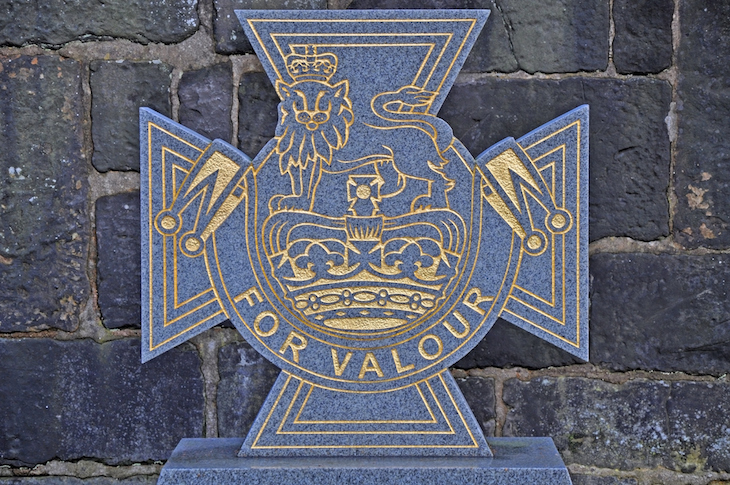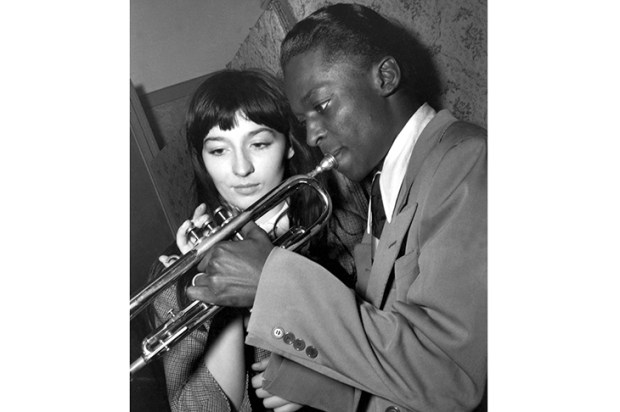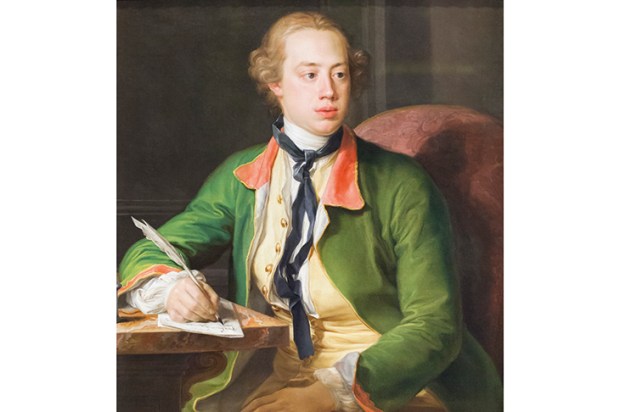‘The Victoria Cross,’ gushed a mid-19th-century contributor to the Art Journal, ‘is thoroughly English in every particular. Given alike to the highest and the lowest in rank, but given always with a cautious and discriminating hand… the Victoria Cross is an epic poem’. Like all epic poems, the VC has its tragedies. For some that tragedy lay on the field of battle; for others, as Brian Izzard details in his often depressing new book, it lay in the life that followed.
The original Royal Warrant by which Victoria instituted her eponymous medal stipulated that it was to be given only for service ‘in the presence of the enemy’ for some ‘signal act of valour, or devotion to country’. Recipients were to receive a pension of £10 a year (worth £985 in today’s money, rather less than the tax-free £10,000 now offered) and were eligible to win it more than once (only three have won it twice, none more than twice). Most importantly, it was to be awarded without reference to rank, length of service, or wounds — and everyone, from civilians to buglers, drivers and Brigadier Generals, have since won this most distinguished gong.
Victoria’s Warrant also ordained that ‘if any person on whom such distinction shall be conferred, be convicted of treason, cowardice, felony or of any infamous crime … his name shall forthwith be erased from the registry’. This has been done only eight times, and not since 1908. In 1920, George V took the view that even if a VC were hanged for murder he should be allowed to wear his medal ‘on the scaffold’, and the position appears to have stuck.
One wonders whether the King’s views were cemented by the experience of George Ravenhill, to whom he had given the VC in 1901. Private Ravenhill had helped save guns and officers during the disastrous action at Colenso in the Boer war and had later won a Distinguished Conduct Medal at Frederikstad. By 1906, however, he and his wife and children were in the Erdington workhouse, and two years later he was convicted of stealing. He claimed that the Government owed him a pension of £50, and that, had he received it, he would not have needed to resort to theft. He was sentenced to a month in jail and had his VC struck down — the last to be so treated. He re-enlisted to fight and survive the Great War, ending his days penniless once again, and in an unmarked grave.
Izzard tells 27 such stories — many of which explain why (in his excellent phrase) some have found it ‘easier to win the medal than to wear it’. Some inclusions, though entertaining, are a bit of a stretch. Field Marshal Evelyn Wood, a major military figure of the 19th century, does not really belong in a book about people ‘whose lives ended in tragedy or disgrace’ — though his involvement in a classic Victorian court scandal involving Charles Stewart Parnell, Gladstone, and a very wealthy aunt makes a fine story. Another minor criticism is the lack of synthesis — the introduction is two short pages, and it would have been valuable to have drawn some common themes together.
These themes are often predictable enough: poverty, bad luck in the face of the law, and trauma. An apposite case is that of Lieutenant Edward St John Daniel, the middle-class son of a Bristol lawyer who joined the navy before he was 15. He saw intense action in Rangoon and the Crimea and received the VC in 1855 when only 18. By 1858 he was drinking heavily and two years later was in front of a court martial. Excused because of his record, he was arrested the next year for ‘indecent liberties’ (presumably sodomy) and by 31 he was dead. One hopes he would have received greater support today.
For some, public attention brought its own unsolicited troubles. Lieutenant Ian Fraser, a cross-winner himself, put it thus: ‘A man is trained for the task that might win him the VC. He is not trained to cope with what follows.’ One of his comrades, James Magennis, a diver, won a VC in 1945, in the same action that saw Fraser sowing limpet mines on to a Japanese ship. Magennis was a Northern Irish Catholic who, on returning home, received a publicly funded ‘shilling fund’ of £3,066, which he quickly spent on demob happiness. He got into debt, sold his medal and received hundreds of pieces of hate mail for having so done. Loyalists saw him as a Catholic, nationalists as a collaborator, so he upped and went into exile in Yorkshire. A decade after his death, a memorial was finally built in Belfast to the only man from the province to win a VC in the second world war.
It’s a fitting way for Izzard to end his book: an implicit reminder that remembrance should emphasise bravery over error.
Got something to add? Join the discussion and comment below.
Get 10 issues for just $10
Subscribe to The Spectator Australia today for the next 10 magazine issues, plus full online access, for just $10.
You might disagree with half of it, but you’ll enjoy reading all of it. Try your first month for free, then just $2 a week for the remainder of your first year.














Comments
Don't miss out
Join the conversation with other Spectator Australia readers. Subscribe to leave a comment.
SUBSCRIBEAlready a subscriber? Log in